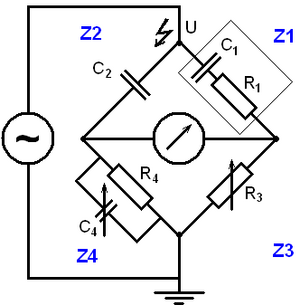Engineering:Schering bridge
From HandWiki
Revision as of 16:14, 12 April 2022 by imported>Steve Marsio (correction)
Short description: Electrical circuit
The Schering bridge is an electrical circuit used for measuring the insulating properties of electrical cables and equipment.[1] It is an AC bridge circuit, developed by Harald Schering. It has the advantage that the balance equation is independent of frequency.
The connections of the Schering bridge under balance conditions are shown in the figure below.
In this diagram:
- C1 = capacitor whose capacitance is to be determined,
- R1 = a series resistance representing the loss in the capacitor C1,
- C2 = a standard capacitor,
- R3 = a variable non-inductive resistance,
- C4 = a variable capacitor,
- R4 = a non-inductive resistance in parallel with the variable capacitor C4.
References
- ↑ Schering Bridge (Measurement of Capacitance), Myclassbook, 2 August 2013
 |


